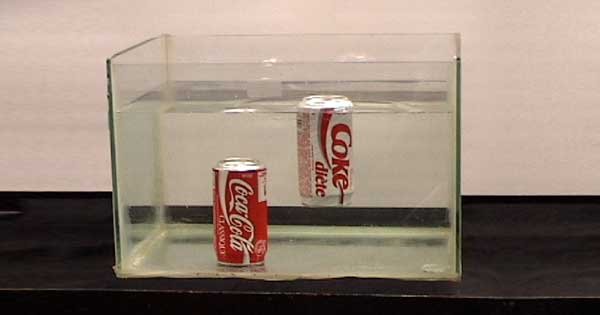If you put a can of diet coke in water it floats regular coca cola sinks

If you put a can of Diet Coke in water, it floats. Regular Coca-Cola sinks.

When it comes to fizzy beverages, Diet Coke and regular Coca-Cola appear quite similar at first glance. However, an intriguing fact is that if you place a can of Diet Coke in water, it floats effortlessly, while regular Coca-Cola tends to sink. This curious phenomenon has piqued the interest of many, prompting them to wonder: what causes this difference?
To understand the reason behind this peculiar behavior, it is essential to delve into the composition of these two popular soft drinks. Regular Coca-Cola contains a significant amount of sugar or high-fructose corn syrup, contributing to its dense nature. On the other hand, Diet Coke is sweetened with artificial sweeteners like aspartame, which are much lighter than sugar.

The disparity in density plays a vital role in determining whether a can of soda will float or sink in water. In this case, it’s all about the inherent differences in the sweeteners used. When the can of Diet Coke is immersed in water, the lighter artificial sweeteners cause the overall density of the soda to be less than that of water. As a result, the can floats, defying gravitational forces.
On the contrary, regular Coca-Cola contains sugar or high-fructose corn syrup, which significantly increases its density compared to water. Consequently, when a can of regular Coca-Cola is placed in water, its density surpasses that of water, causing it to sink.
This unique behavior can be attributed to the physical property known as buoyancy. According to Archimedes’ principle, an object will float or sink based on the relationship between its density and the density of the liquid it is placed in. When the object’s density is lower than that of the liquid, it will float, and if it’s higher, it will sink.
While it may seem like a simple and fun experiment to observe the floating or sinking nature of these two beverages, it is worth noting that other factors can influence the results. These factors may include the temperature of the water, variations in can size, or even differences in the carbonation levels of each drink.
In conclusion, the science behind why a can of Diet Coke floats while regular Coca-Cola sinks lies in the density of the respective sweeteners used. Diet Coke, sweetened with artificial sweeteners, has a lower density compared to water. This causes it to float effortlessly when placed in water. On the other hand, regular Coca-Cola, containing sugar or high-fructose corn syrup, has a greater density than water, causing it to sink. This fascinating phenomenon showcases the importance of understanding the properties and compositions of the items we encounter daily.
Source: Business Insider
Related Posts
Quick Links
Legal Stuff

